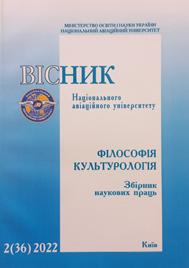IDENTITY AND COLLECTIVE ACTION – SYSTEM APPROACH
DOI:
https://doi.org/10.18372/2412-2157.36.16966Keywords:
human, society, historical memory, consciousness, collective action, mythologization, globalization, identityAbstract
Introduction. The article examines the phenomenon of identity within the formation of collective action in societies with the “Between” status.
This status is a condition for the formation of Homo, who is ready to survive and adapt to the imposed conditions. The aim determines the need
for a comprehensive analysis of approaches to the phenomenon of identity in terms of the formation of collective action. This aimdetermines the
epistemological and praxeological components of the formation of a new type of Homo. The tasks of the study are clarifying the essence of the
main concepts within the selected problem, that are important in the process of becoming a person; defining the place of freedom as an
opportunity to act; developing an interpretative scheme of collective action for the processes of creation of Homo through identity. Research
methods. In order to study the issue in detail and justify the conclusions, the following methods were used: 1) general: comparison, analysis,
synthesis, abstraction, and specification; 2) special: historical method, civilizational method, and behavioral. Research results. Considering the
values, it has been demonstrated that a society whose collective action is aimed at development and life, using freedom, will choose the path of
civilization and will fight for it. This is due to the human desire for life filled with dynamic change. Discussion. However, this is not the case with
totalitarian societies. The role of historical memory and the collective unconscious within the mythologizing of consciousness has been
identified. In particular, it has been demonstrated that the mythologizing of consciousness, and the lack of objective analysis of historical
events have negative consequences for collective agents, based on the fact that they are active participants in the processes of state
formation and history. Conclusions. The phenomenon of identity is examined in the article through the socio-political and socio-economic
processes occurring in the country and in the world. After all, these processes are becoming the landmark of the globalized world, which
determines the collective identity of the agent. The consequence of such certainty is the impact on reforming the entire social system.
References
Brunn G. Die europäische Einigung von 1945 bis Heutе. Stuttgart: Verlag Philipp Reclam, 2009. 339 р.
Huntington P. Samuel. Who Are We? The Challenges to America's National Identity. By Samuel P. Huntington. New York: Simon and Schuster, 2004. 448 p.
Mudrakov V.V., Polishchuk O.S. Some Considerations on the Typology of Philosophical-Anthropological Models (To the Problem of
Value Identifications of Ukrainians). Антропологічні виміри філософських досліджень. 2018. Вип. 14. С. 7-19.
Бауман З., Донскіс Л. Плинне зло. Життя без альтернатив / пер. з англ. О. Буценка. Київ : Дух і літера, 2017. 215 с.
Берґсон Анрі. Творча еволюція / пер. з фр. Р. Осадчука. Київ : Видавництво Жупанського, 2010. 318 с.
Горенко О. М. Прагматика європейського досвіду як методологічна проблема історіописання. Київ: Інститут історії України НАН України, 2011. 264 с.
Донскіс Л. Збентежена ідентичність і сучасний світ. Київ: Факт, 2010. 312 с.
Киридон А. Європейська ідентичність: структурування смислового простору. Європейські історичні студії. 2015. № 2. С. 26-53.
Крепон М. Європейські іншості / пер. з франц. О. Йосипенко. Київ: Український центр духовної культури, 2011. 184 с.
Кули Ч. Социальная самость. Американская социологическая мысль: тексты/сост. Е.И. Кравченко; под. ред. В.И. Добренькова. Москва : Изд-во МГУ, 1994. С. 172-179.
Лебон Г. Психологія мас / пер. з франц. Я. Мишанича. Київ: Андронум, 2021. 138 с.
Масненко В. В. Історична пам’ять як основа формування національної свідомості. Український історичний журнал. 2002.
№ 5. С.49-61.
Мид Дж. Интернализованные другие и самость. Американская социологическая мысль : тексты / сост.
Е. И. Кравченко; под. ред. В. И. Добренькова. Москва : Изд-во МГУ, 1994. С. 222-224.
Мозгова Н. Г. Соціальний вимір колективної пам’яті. Вісник Національного авіаційного університету. Серія: Філософія.
Культурологія. 2021. № 2 (34). С. 20-23.
Поліщук О. С., Поліщук О. В. Особливості ідентифікаційних процесів у перехідних суспільствах (аксіологічний контекст).
Humanities Studies. Філософія: збірник наукових праць. 2021. Випуск 9 (86). С. 37-45.
Сміт Е. Національна ідентичність / пер. з англ. П. Таращука. Київ: Основи, 1994. 224 с.
Яхтенфукс М., Колєр-Кох Б. Урядування та створення інститутів. Європейська інтеграція / уклад. М. Яхтенфукс, Б. Колєр-Кох; пер. з нім. М. Яковлєва. Київ : Видавничий дім «Києво-Могилянська академія», 2007. С. 9-32.

